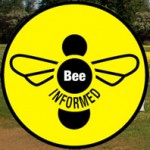
BOONE—Appalachian State University’s Department of Computer Science is part of a nationwide network to monitor and maintain honey bee health.
The Bee Informed Partnership is a five-year, $5 million program funded by the U.S. Department of Agriculture’s National Institute of Food and Agriculture and is led by Penn State.
Other university partners are the University of California, University of Illinois, University of Georgia, University of Tennessee, University of Minnesota, North Carolina State University and Lincoln University. The Florida Department of Agriculture and NASA are also part of the project.
The Bee Informed Partnership will use an epidemiological approach to identify common bee management practices and use them to develop best practices on a regional and operationally appropriate level. The partnership will include many institutions already involved in pollinator work, but will also strive to include citizens involved in bee keeping or other aspects of the problem for data collection and integration.
The multistate team hopes that their work and especially their educational efforts to introduce the best management practices will reduce national losses in honeybee populations by 50 percent in the next five years.
“We would like to reduce honey bee mortality, increase beekeeper profitability and enhance adoption of sustainable management systems in beekeeping,” said Dennis vanEngelsdorp, senior extension associate with the Pennsylvania Department of Agriculture who will lead the project. “At the same time we want to increase the reliability of production in pollinator dependent crops and increase the profitability of pollinator-dependent producers.”
Appalachian’s Department of Computer Science, housed in the College of Arts and Sciences, was awarded $729,736 through the project to create and maintain a honey bee health database with an interactive web-based interface that also will provide valuable feedback to beekeepers as well as information for future research. Appalachian’s funding will support full-time research associate as well undergraduates who will work part time on various aspects of information technology support.
Department chairman James Wilkes’ experience as a beekeeper and his desire to blend computer science with the science of beekeeping led to the university’s involvement in the project. “Personally, I had a horrible winter this past year with my own bees,” he said. “I thought I was doing what I was supposed to do, but something happened and I lost a lot of bees. That’s what’s been happening in the beekeeping world for the past several years.”
Wilkes said the database will enable beekeepers to provide real-time information about their hives, which in turn may help others determine if winter losses are related to a virus, pesticides or other causes. “Everyone in the beekeeping world is trying to discover what’s causing these losses,” he said.
Wilkes said the Bee Informed Partnership database also will provide historical as well as current data that will become a much-needed source of information for future research.
Computer science majors and faculty at Appalachian have already developed an Android mobile phone application that will help beekeepers keep track of beehive maintenance. Hive Tracks, the Web application found at www.hivetracks.com, provides a simple electronic way for beekeepers to record data and keep track of maintenance they have performed and future maintenance needed for the hives.
Penn State and project partners will also survey colony mortality, pathogens and parasites, as well as beekeeping management strategies, costs and outputs. They will create a pollinator quality and availability reporting system and an emerging-issues alert system.
Some of the surveys planned by the partnership include the continuation of the colony winter loss survey, an annual survey of management practices and a survey of pollinator availability. Other surveys will focus on determining colony mortality, parasite loads and socioeconomic factors.
“By surveying beekeepers about their management practices as well as their colonies’ overwintering success, we can use epidemiological methods to tell beekeepers which practices work and which do not,” vanEngelsdorp said.
For more information about the Bee Informed Partnership, visit http://beeinformed.org.





No comments:
Post a Comment